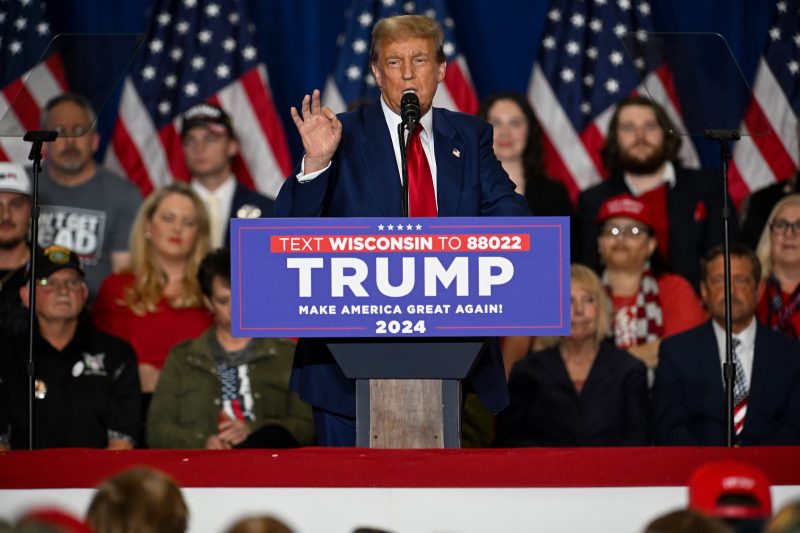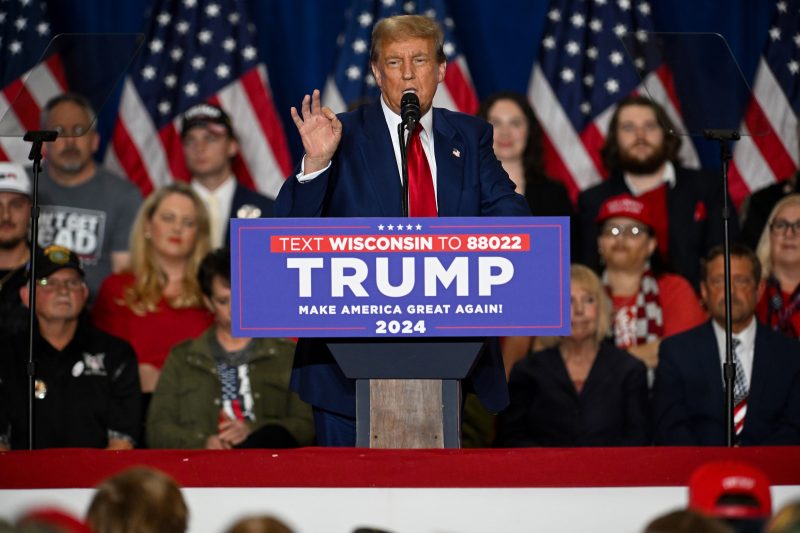
Former president Donald Trump, who has wavered between highlighting and downplaying his role in curtailing abortion rights, suggested Monday that the politically volatile issue should be left to states, after months of mixed signals about his position.
In a video posted on social media, Trump took credit for the overturning of Roe v. Wade but rebuffed pressure to campaign on a national limit. It is “now up to the states to do the right thing,” he said.
“My view is now that we have abortion where everybody wanted it from a legal standpoint, the states will determine by vote or legislation or perhaps both, and whatever they decide must be the law of the land. In this case, the law of the state,” Trump said in the video.
Trump campaigned in 2016 on appointing Supreme Court justices who would overturn Roe v. Wade and became a champion of the antiabortion movement. But he has waffled on the issue since Roe fell in 2022, as Republicans up and down the ballot have paid a political price for unpopular bans. Democrats have made abortion central to their case against Trump, relentlessly reminding voters of his Supreme Court picks who helped end a nationwide right to the procedure.
Trump had promised a “statement” on abortion last week, as reporters pressed him for his opinion on a six-week ban poised to take effect in Florida. That set off a flurry of last-minute lobbying from abortion opponents who are divided over the best path forward. Some urged Trump to get behind a national ban on abortions after 15 weeks of pregnancy, while others warned that such restrictions are a nonstarter in Congress and could further galvanize the left.
On Sunday, he teased an imminent announcement on social media, saying that “Republicans, and all others, must follow their hearts and minds,” while emphasizing that he supports exceptions to abortion bans for rape, incest and the life of the mother. Trump added, “We must use common sense in realizing that we have an obligation to the salvation of our Nation … to win elections.”
The presumptive GOP presidential nominee began his video by affirming his support for in vitro fertilization, a process that fertilizes eggs outside the womb to help produce a pregnancy.
A nationally watched court ruling in Alabama in February threatened to shut down the fertility treatment by holding that frozen embryos are people. Republican candidates largely scrambled to distance themselves from the ruling, though some in Congress have endorsed legislation that would recognize a fertilized egg as a human being entitled to legal protections under the 14th Amendment.
Trump’s emphasis on IVF support underscored the issue’s potential danger to conservatives at the ballot box. He praised Alabama Republicans for quickly passing a law protecting IVF in the state and said that “we want to make it easier for mothers and families to have babies, not harder.”
Trump has repeatedly highlighted the political fallout of abortion for Republicans. He has suggested on social media that GOP losses in the 2022 midterms were due to the “abortion issue,” which he described as “poorly handled by many Republicans, especially those that firmly insisted on No Exceptions.”
Trump spent much of the GOP primaries declining to take a firm stance on federal legislation and even described Florida’s six-week abortion ban — signed by his rival, Gov. Ron DeSantis — as a “terrible mistake.” During a CNN town hall last year, Trump declined to say whether he would sign a federal abortion ban into law and insisted that overturning Roe put the antiabortion movement in a “very good negotiating position.”
In a September interview on NBC News’s “Meet the Press,” Trump predicted that “both sides will come together.” He said the agreement could be state or federal, adding: “I don’t, frankly, care.”
More recently, he said in a March radio interview that “people are agreeing on 15 [weeks], and I’m thinking in terms of that.” But he also said that “all the legal scholars on both sides agree: It’s a state issue. It shouldn’t be a federal issue.”
Yet as president, he backed a national 20-week ban that could pass in Congress and at the time ran afoul of Roe. Under Roe, Americans nationwide had a right to abortion until a fetus was viable outside the womb, often pegged at around 24 weeks of pregnancy.
Many antiabortion activists view federal restrictions on abortion as impractical, given the difficulty of securing the 60 Senate votes necessary to overcome a filibuster. A 15-week ban introduced by some Republicans in Congress has gone nowhere. Social conservatives planning for a second Trump term have focused on actions that federal agencies could take without Congress to make abortions harder to obtain.
At the same time, some Republicans have argued that GOP candidates need to talk about abortion more explicitly to avoid ceding the issue to Democrats.
When a court cleared the way last week for Florida’s six-week abortion ban to take effect, Trump’s campaign gave reporters a statement that made no mention of Trump’s role in ending Roe. “President Trump supports preserving life but has also made clear that he supports states’ rights because he supports the voters’ right to make decisions for themselves,” said the statement from campaign adviser Brian Hughes.
Democrats rushed to remind voters of Trump’s record. On social media, President Biden drew attention to Trump’s past statement that “without me, there would be no 6 weeks.”
“You already made your statement, Donald,” Biden wrote last week after Trump promised to address abortion further.

